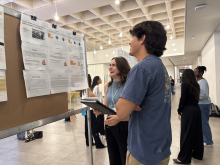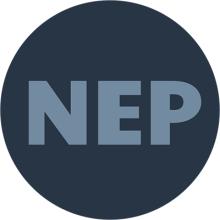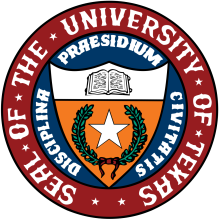PTF Impacts
Provost's Teaching Fellows have made lasting impacts in their departments, colleges and schools, all of the University of Texas, and even the broader scholarship of teaching and learning. Through both individual initiatives and university-wide programs, PTFs continue to serve as catalysts for positive change and further our campus culture of teaching and learning.
Displaying 1 - 9 of 9
Applications of Data Science with City Datasets: Poster Session at UT Austin
On April 30, 2025, Guyot hosted a public poster session showcasing student projects focusing on datasets from the City of Austin Open Data Portal, held at the University of Texas at Austin. Projects ranged widely in focus, from environmental data to transportation and public safety, demonstrating the breadth of student inquiry and analysis.
City of Austin Data Meetup (online)
At the end of each semester, about 10 students volunteer to present their findings to the City of Austin employees during one of their regular data meetups.
Open Data Day (Austin Public Library) and Statistics Seminar (Texas State University)
Two presentations about promoting the use of a local open data portal for data science projects.
The first presentation was made with the collaboration of a former student/current UGCA at an event organized by Open Austin, which addresses local social and civic challenges through creative uses of technology.
The second presentation was made at the weekly statistics seminar at Texas State University with mostly professors in attendance.

Interview with Dr Erika Bsumek, the creator of ClioVis (Not Even Past, UT Department of History)
In September 2020 History faculty Adam Clulow interviewed Erika Bsumek for Not Even Past, the digital magazine of the UT Department of History, to discuss the development, use, and impacts of ClioVis, the digital timeline visualization tool created as part of Bsumek's PTF Initiative. This article is part of a wider series that explored how teachers and students across the History department, the university and world more generally responded in new ways to the unprecedented classroom environment faced in a time of global pandemic.

Digital Projects Enrich Undergraduate Research: ClioVis and Epoch (History Department News)
ClioVis, the digital timeline visualization tool created by Erika Bsumek as part of her PTF Initiative, was highlighted in UT Department of History News on May 25, 2020 by Dr. Megan Raby. The article explored the ways that ClioVis and Epoch, an initiative by History faculy Adam Clulow, are being used to create undergraduate research opportunities for UT liberal arts and history students.

Critical Literacies Project: ClioVis (UT System P20 Projects)
The UT System works with internal and external partners to foster critical literacies in students across the P20 continuum. UT institutions work to cultivate these literacies in students across traditional and emerging academic disciplines, and through partnerships and programs in PK12 schools, communities, and business and industry across Texas.

Editor's Choice Award: ClioVis Description, Origin, and Uses (Digital Humanities Now)
"ClioVis: Description, Origin, and Uses," a September 2020 article from Not Even Past: the digital magazine of the UT Department of History, was awarded Editor's Choice by the online aggregate Digital Humanities Now.

ClioVis Digital Timelines: Visualizing Connections
Erika Bsumek built the ClioVis digital timelines platform for instructors and students to build interactive digital timelines as part of their coursework or scholarly initiatives. The platform has been used by thousands of students across the US, including throughout the UT System, University of Michigan, Stanford, and others, in both humanities and STEM disciplines, as well as for research initiatives.

FromthePage, Crowdsourced Digital Archiving (UT Libraries Instance)
As part of his PTF Initiative, Adam Rabinowitz developed two UT resources for crowd-sourcing humanities archival and historical work and student “citizen science:" FromthePage (partnered with UT Libraries) and Nanosourcer (a Canvas plugin). UT’s customized FromthePage instance is permanently supported by UT Libraries, publicly available, and has nearly 1000 users working on over a dozen different archival collections.

